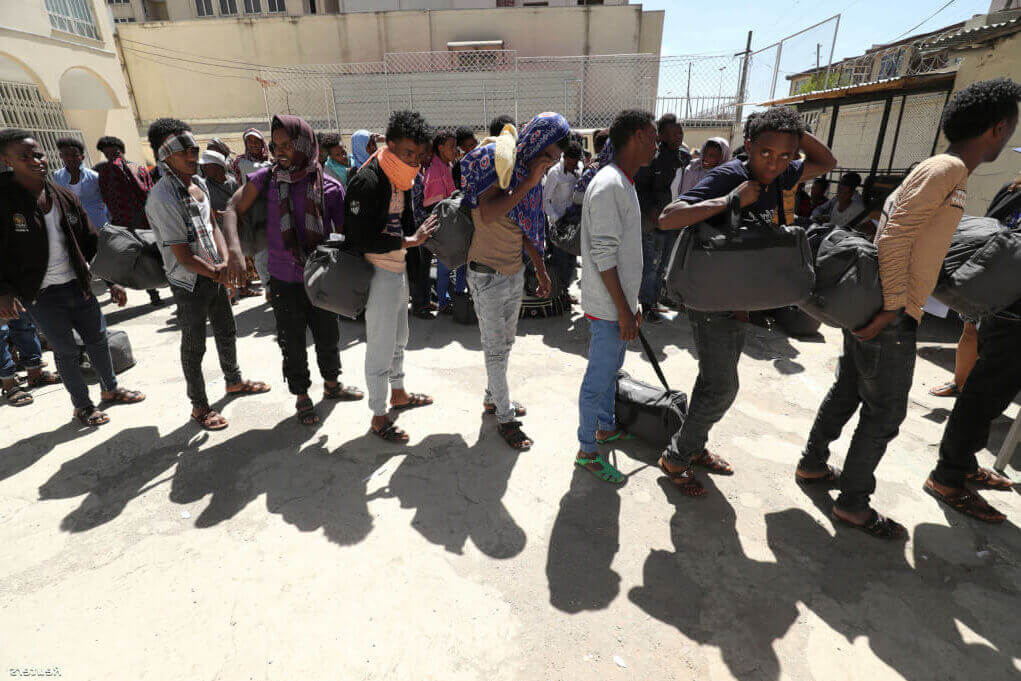Migrants died and dozens were injured when a fire broke out on Sunday at a shelter in the Yemeni capital, according to the International Organization for Migration.
Apart from the narrative that international organizations convey about the Houthis, another story is being circulated that may rise to be a “war crime”, that the shelter was burned by Houthi fighters who had thrown firebombs on the migrants.
The International Organization for Migration says the fire killed eight people, and 170 wounded, 90 of them seriously.
The organization called on the Houthis to provide access to migrants who were burned, to provide them with appropriate treatment, especially in light of the presence of serious injuries among them.
Humanitarian organizations and the United Nations have previously accused the rebels, who control Sanaa and most of northern Yemen, of obstructing their work.
Despite the war, Yemen is a transit point for tens of thousands of migrants traveling between the Horn of Africa, Saudi Arabia and other Gulf countries.
Asylum seekers from Ethiopia and Somalia make up the majority of refugees and asylum seekers hosted by Yemen, who number 270,000, according to UNHCR figures.
international organizations
The organization’s statement indicates that there are about 900 migrants at the scene, most of them Ethiopians, where teams of health workers, ambulances, and medical supplies have been dispatched to hospitals.
FILE PHOTO: Armed Houthi followers ride on the back of a truck after participating in a funeral of Houthi fighters killed in recent fighting against government forces in Yemen’s oil-rich province of Marib, in Sanaa, Yemen February 20, 2021. REUTERS/Khaled Abdullah/File PhotoDuring the past 24 hours, international organizations concerned with migrant affairs tried to persuade the Houthis to allow them to inspect the location of the fire, amid refusal by the security authorities.
The international organization called on the authorities in Sana’a to allow “urgent” access to provide treatment for migrants injured in the fire.
War crime and mass graves
Jamda Suti, head of the Oromia Future Network for Ethiopian News, said in exclusive statements to Al-Hurra that what happened with Ethiopian immigrants in Sana’a requires an international investigation, as they were exposed to a war crime that may be considered genocide, as he put it.
In the details, he explained that weeks ago, the Houthis began to imprison any African immigrant in Sana’a, although most of them reside there under official residency permits that are not against the law, but they were given 3 options.
The first of these options is to participate in the fighting alongside the Houthis on the border with Saudi Arabia, and the second is to pay sums amounting to 150,000 riyals in exchange for allowing them to leave and return to their country, and the third is imprisonment, which was the share of about 4 thousand immigrants.
Soti added that even those who agreed to fight on the border, reports have returned that many of them have been killed, as they are placed in the front lines in the areas where the fighting rages.
He added that, since February, he had been in contact with a number of Ethiopian immigrants who were in detention centers, as they were living in absolutely inhuman conditions, and some of them had been imprisoned there for 7 months without any reason.
In protest against the conditions in which they live and their refusal to fight with the Houthis, these migrants went on hunger strike, in a move that angered the Houthis, and some of their fighters entered the place of detention and forced them to eat and broke the state of the strike. Detention.
This prompted the Houthi fighters to request reinforcements, and they threw incendiary bombs at the shelter, which has caused the death of more than 500 people so far as a result of the burns they suffered.
Soti indicated that, during the night of Monday, Houthi fighters collected the bodies of many of the dead and buried them from mass graves, according to what eyewitnesses reported to him from Sana’a.
He confirmed that all the information that he had came from eyewitnesses and some immigrants who were able to flee the shelter during the fire, in addition to video clips.
The ethnic Ethiopian immigrants’ community in Sana’a takes a stand in front of the United Nations High Commissioner in Sana’a, where they are requesting an international investigation into the disaster that occurred.
A narration of the Houthi group
The Houthi Ministry of Interior issued a statement on Sunday saying that “the fire occurred at 2:30 pm and caused the death and injury of a number of illegal immigrants and workers at the Immigration and Passports Authority,” indicating that investigations are continuing to find the cause of the fire.
Members of the Yemeni Iran-backed Huthi rebels military police parade in the streets of the capital Sanaa on January 8, 2020 during the “martyrs’ week. (Photo by MOHAMMED HUWAIS / AFP)In the statement, the Houthi authorities held “the International Migration Organization and the United Nations fully responsible for this incident, for failing to play its role in providing shelters for gathering and accommodating illegal immigrants, and deporting them to their countries in accordance with international laws.”
Obliterate the contours of the crime
The Minister of Information in the internationally recognized government, Muammar Al-Eryani, condemned the “horrific crime” that African immigrants were subjected to at the hands of the “Iranian-backed Houthi militia” in Sana’a, which caused the death of hundreds of Ethiopians.
In a press statement, he warned of the Houthi’s efforts to “obliterate the causes and milestones of the crime that reveal video clips and images circulating the size of their ugliness.”
Al-Eryani called for the need for an “transparent and independent” international investigation to reveal the details of the incident and hold those involved in it accountable.
He also called for pressure on the Houthis to stop the forced recruitment of immigrants and their exploitation in battles, and to release all of them and allow them freedom of movement.
Demand for an international investigation
Nabil Al-Bukairi, a Yemeni researcher and journalist, agreed with Soti’s account, whereby the Houthi group arrests any African refugees, even though they hold asylum cards from the United Nations offices in Sana’a.
Speaking to Al-Hurra, he indicated that he had contacted sources, eyewitnesses, and families of migrant victims who were in the shelters.
The families of the victims were quoted as demanding an international investigation committee to investigate the facts about this crime that claimed the lives of their families and relatives.
Al-Bakiri emphasized that the number of deaths exceeds the announced figures, which exceed 500 people, while more than 1500 of them were subjected to burns and wounds. The victims were buried in cemeteries outside the capital.
The testimony of a survivor of the fire was quoted as saying, “The place of detention they were in because they refused to fight with the Houthis was subjected to fire bombs being thrown by Houthi fighters.”
He added that even those who go to fight are usually killed within a short period of time as they are placed at the front of the fighting fronts and that the real numbers of those killed in the fire are much greater than what international organizations or the Houthis say.
Thousands of migrants remain stranded in Yemen, where years of conflict between the government and rebels since 2014 have claimed tens of thousands and displaced millions in the context of a humanitarian crisis that the United Nations considers the worst in the world.












